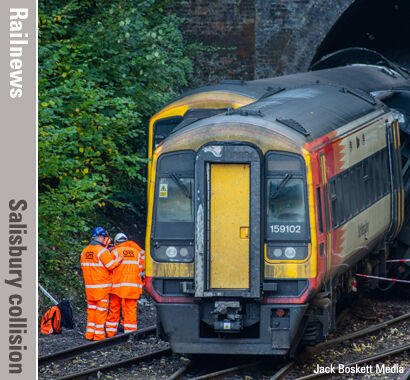Updated 10.27
THE Rail Accident Investigation Branch has revealed that the collision between two trains outside Salisbury station on Sunday night was caused by slippery rails on the approach to a junction, which meant that one of the trains involved could not stop before it collided with the other.
The train which failed to stop and ran through a red signal was an SWR service from London to Honiton, which was approaching Salisbury Tunnel Junction on the up side of Salisbury station just when a Great Western Railway train from Portsmouth to Bristol was passing over the junction.
Deputy RAIB chief inspector Andrew Hall said: 'From the initial evidence we have collected, we know that that the passage of the Great Western train travelling from Eastleigh across Salisbury Tunnel Junction was being protected by a red signal. At this junction, trains coming from Eastleigh merge with those from Basingstoke, so the South Western service coming from Basingstoke was required to stop at that signal.
'Unfortunately, it did not stop and struck the side of the Great Western train at an angle such that both trains derailed and ran alongside each other into the tunnel just beyond the junction. Initial evidence indicates that the South Western train driver applied the brakes as it approached the junction and the red signal, but the train was unable to stop before passing the signal.
'This evidence suggests that the most likely cause of this was wheelslide, almost certainly a result of low adhesion between the wheels and the track. We are continuing to pursue this as a line of investigation amongst others.'
A more detailed report from the RAIB has now been issued, and this confirms that there were several brake applications on the SWR train before the collision, including an emergency TPWS response.
South Western Railway has paid tribute to the driver involved. It said: 'Early assessment shows the South Western Railway driver reacted correctly to the signals by braking to slow the train down. While the investigation has a long way to run, these initial findings are helpful to stop speculation and focus attention on the evidence about the likely cause of the collision.
'Our thoughts are with all those caught up in this serious accident and we will continue to cooperate fully with the relevant authorities as they continue their investigations. We want to pay tribute to our driver who was injured on Sunday night. He is a deeply respected colleague, who has over 50 years’ experience of driving on this route and an excellent professional track record. All our drivers are regularly assessed to the highest standards and he has fully satisfied all requirements. Initial findings indicate that the driver acted in an impeccable way in a valiant attempt to keep his passengers safe, staying at the controls throughout. We thank him for his actions and we wish him a speedy recovery as he continues to be treated in hospital.'
Disruption through Salisbury is set to continue until next Monday while work at the crash scene continues. The RAIB alone has sent at least five inspectors, while evidence is also being gathered by the Office of Rail and Road, British Transport Police and Network Rail.
Network Rail's safety and engineering director Martin Frobisher said: 'Sunday’s accident was incredibly frightening for everyone involved and our thoughts are with everyone injured or affected in any way. Initial findings suggest that low adhesion played a key part in causing the collision. It’s an issue that affects railways across the world and is something that we, and our train operator colleagues, work hard to combat – so that we can run trains safely and reliably throughout autumn, and why incidents such as the one in Salisbury at the weekend are incredibly rare.
'We will continue to work closely with investigators to understand what happened and what more we can do to help prevent this happening again.'
For now, hourly SWR shuttle train services are running between Salisbury and Exeter St David's and between Basingstoke and Andover. GWR trains are running only between Portsmouth Harbour and Romsey and between Salisbury and Cardiff Central. Replacement buses are bridging the gaps in the train service.


